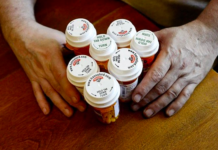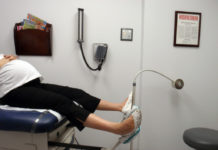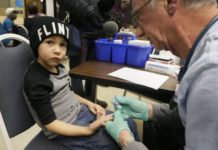Patients More Likely to Refuse Drug-Only Treatment, Study Finds
The American Psychological Association (APA) recently published a study finding that patients assigned to drug-only treatments were more likely to refuse treatment, and more likely to drop out before treatment completion, than patients assigned to psychotherapy only.
Meditation + Exercise = ↓ Depression
A study released in Translational Psychiatry reports that "Although previous research has supported the individual beneficial effects of aerobic exercise and meditation for depression, these findings indicate...
Anticholinergic Drugs, Including Antidepressants, Linked To Later Cognitive Problems
A new study, published in JAMA Neurology, found that older people who regularly took anticholinergic drugs, including certain cold medicines or antidepressants, had poorer...
Patients on Antipsychotics at High Risk for Cardiovascular Issues, Study Finds
Antipsychotics present a known risk for major side effects. A new study suggests that certain antipsychotics may present a greater risk for cardiovascular disease than others.
Tripping for Knowledge: The Psychedelic Epistemologist
In this interview for 3:AM Magazine, Chris Letheby argues that even though psychedelics may induce delusions or imaginary phenomena, their use can also lead to accurate...
Researchers: “Antidepressants Should Not be Used for Adults with Major Depressive Disorder”
A new review, published in BMJ Evidence-Based Medicine, concludes that antidepressants should not be used as the risks outweigh evidence for benefits.
The Effects of Exercise on Depression
From CNN: Exercise may help in reducing depression. Click here for a video on the benefits of exercise for people struggling with depression, including one man's...
“Was Sexism Really Responsible for the FDA’s Hesitancy to Sign Off on Flibanserin?”
“The Food and Drug Administration’s approval of pharmaceutical treatment for low sexual desire in women has launched a heated debate over the dangers and benefits of medicalizing sex,” Maya Dusenbery writes in the Pacific Standard. Is “female Viagra” a feminist victory or a product of clever faux-feminist marketing by Big Pharma?
Systematic Review Finds Antidepressant Withdrawal Common and Potentially Long-lasting
Prominent researchers conduct a review of antidepressant withdrawal incidence, duration, and severity. Results lead to call for new clinical guidelines.
After the Black-Box: Majority of Children Starting SSRIs Still Receiving Too High of Dose
In 2004, the FDA added a black-box warning to SSRI antidepressants on the increased risk of suicide among children taking these drugs. A new study suggests that this warning has increased the proportion of children who begin an antidepressant on a low dose, but the majority are still receiving higher than recommended doses.
Mountain Hiking Improves Hopelessness, Depression, and Suicidal Ideation in High-Level Suicide Risk
Researchers in Salzburg, Austria found that 20 participants who had attempted suicide at least once showed a significant reduction in hopelessness (P < 0.0001),...
Antidepressants and Withdrawal: Readers Tell Their Stories
More than 8,000 people responded to the recent New York Times article on antidepressant withdrawal. Here, reporter Benedict Carey describes differences in the way various...
“You’re Making Your Depression Worse: Self-Help is Bringing Us Down”
Salon magazine reflects on "The Puzzling Reality . . . that human depression is increasing in an era when environmental conditions are relatively benign. The average citizen...
Students With Mental Health Conditions Find Support at BU
From STAT: For the past three years, Boston University has offered one of the few programs in the nation dedicated to teaching students who have...
Study Explores Connections Between Diet and ‘Serious Mental Illnesses’
Study finds that individuals diagnosed with schizophrenia, bipolar disorder, and depression have diets that are more inflammatory and higher in calories.
Research Emphasizes Association Between Inflammation, Diet, and Depression
Study finds adults with a pro-inflammatory diet have a greater incidence of depression.
Report from the Parliament: Can Psychiatry At Least Be Curious?
In the past six years, I have had the opportunity to speak at several conferences or meetings that I felt had particular potential to stir some political activity that would challenge current psychiatric practices, and one of those events was the meeting convened in the U.K.’s Parliament on May 11th, which had this title for the day: Rising Prescriptions, Rising Mental Health Disability: Is There a Link?
New Hope for Depression
In this piece for TIME, Mandy Oaklander provides a comprehensive review of the current status of and potential future directions for the depression treatment industry. The...
Antidepressants During Pregnancy Increase Risk of Psychiatric Diagnosis in Children
New research, based on data from almost a million children in Denmark, suggests that children of mothers who use antidepressants during pregnancy are more likely to be diagnosed with autism and psychiatric disorders.
Lawsuit Over a Suicide Points to a Risk of Antidepressants
From The New York Times: The recent trial of Wendy Dolin, whose husband died of suicide after starting the antidepressant paroxetine, demonstrates our need for more...
Special Issue of Nature Takes on Depression
The November 13th issue of the journal Nature is titled "The Great Depression," and includes various feature stories and commentaries about research into depression,...
More Evidence for the Lasting Psychological Impact of Lead Exposure in Childhood
New research points to numerous harmful effects of high-level lead exposure in childhood on adult mental health and personality characteristics.
Large German Anti-Stigma Campaign Shows Little Effect on Attitudes
“Overall, this study showed that the information and awareness campaign had almost no significant effects on the general public's attitudes toward people affected by either schizophrenia or depression,” the researchers, led by German medical sociologist Anna Makowski, wrote. “One could assume that deeply rooted convictions cannot be modified by rather time-limited and general activities targeted at the public.”
Review of the Evidence: Childhood Adversity High in Schizophrenia and Other Disorders
Researchers from Australia and the UK found that people with a schizophrenia diagnosis almost four times more likely than controls to have a history of...
“Why are Doctors Plagued by Depression and Suicide?”
For STAT news, Judith Graham reports on the escalating crisis of depression, burnout, and suicide among physicians. “Male doctors are 1.4 times more likely to kill...























